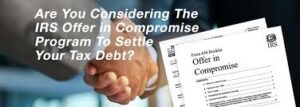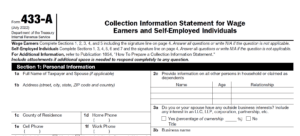If you are unfortunate enough to have IRS Criminal Investigation (CI) target you and execute a search warrant on your residence, cars, and small business KEEP YOUR MOUTH SHUT!!!
Special Agent like to use the element of surprise, so more often than not, they will unexpectedly knock on your front door, usually very early in the morning, in either your home or place of business.They do this to catch you offguard and so you'll be unprepared and spill your guts. Imagine that you're getting ready to leave for work, take your kids to school, or just having your morning cup of coffee. Then a loud knock knock knock and two special agents are at your front door, flashing their gold badges and carrying guns, telling you they need to ask you some questions?
Politely and nonconfrontationally, ask for their business card and tell the Special Agents that you are not comfortable speaking with them at this time and you will have your criminal tax attorney contact them.
Do not say anything else and go back into your house or office.
Unless they have an arrest warrant, they cannot arrest you; and if they haven't shown you in a restaurant at the beginning of the contact, odds are they don't have one. Same for search warrant; unless they have a search warrant, you are not obligated to provide any documents or other items.
Do not provide any information, documents or other items, or ask any questions.
Anything you say can be used against you, even where you were told that you're being contacted as a witness and are not a target of an investigation.
While the agents can appear friendly and may try to make it seem like they are there to help you, keep in mind there investigating what they believe is a federal tax crime.
Here is what to expect:
An IRS Special Agent with information sufficient to establish probable cause for a search warrant has filed an affidavit with a US Magistrate and obtains a search warrant.
The affidavit will be “sealed” to prevent access to the contents. The agent (armed with guns, bullet proof vests and badges) will marshal forces with his fellow agents and possibly the local police department and to systematically execute the warrant with a team of investigators. They will take all of your business and personal records. If you maintain a “cash hoard” in a shoe box or safe deposit box, they may seize it as evidence of the crime of Income Tax Evasion (Title 26 USC 7201) or income Tax Fraud (Title 26 USC 7206(1)).
For those involved in illegal activities, there may be Money Laundering charges under Title 18 USC, 1956 and 1957. This is the start of a long “Grand Jury” investigative process that will be unsettling and confusing to most individuals and inexperienced attorneys. The services of an expert private investigator are required to assist your attorney in the defense of a criminal income tax investigation (Pg 2) conducted through this “Grand Jury” or “Administrative” Investigation.
There are two type of investigation conducted by IRS Criminal Investigation they are the “Grand Jury” investigation which with the assistance of an Assistant US Attorney (AUSA) allows the use of Grand Jury Subpoena, governed by Federal Rules of Criminal Procedure Rule 17, such as a Subpoena Duces Tecum (Bring with you records.) to gather evidence of the crime. The second is the “Administrative Investigations” conducted through the use of IRS Summons which are similar to a Federal Grand Jury Subpoenas or Trial Subpoena and require the production of records, but are more cumbersome than the Grand Jury Subpoena.
Your reaction to the search warrant is critical at this time because, during the execution of the search warrant, you will be anxious to tell your side of the story. You are and honest person but you should stop and tell the agent you wish to speak to an attorney. In a “Grand Jury” investigation, you will not be read your rights as is required during an “Administrative” Investigation where the Internal Revenue Manual (IRM) requires that a non-custodial Miranda warning be read to the target. Even though you are confused and do not have a criminal law attorney that practices in the Federal Courts ask to speak to one before further responding. The agent is required by case law and procedure to stop asking you questions. Do not be tempted to continue answering questions no matter what the agent says, statements you make are being witnessed and will be documented in writing and used against you later. Do not be afraid to stop the questioning and “lawyering up,” this is your right under the Constitution of the United States.
During the search the agents will present a copy of the Search Warrant which sites the charges that are alleged and provides other information; including the name of the Special Agent that signed the Warrant. This information should be provided to the defense attorney. Generally, the agent will not talk to the attorney during the search and until a Form 2848 Power of Attorney is prepared for the individuals and all entities, signed by the client, and delivered to the IRS CI office. The Special Agent will leave a computer generated inventory of the items seized from the premises.
HERE ARE EIGHT STEPS TO HELP YOU GET ORGANIZED
- Contact your business attorney and ask for a referral to a criminal attorney that has experience in the Federal Court System. Former Assistant US Attorneys in private practice are generally excellent in these cases. They know the system and are generally respected by the AUSA.
- The criminal defense attorney should prepare a letter of representation to the AUSA on the case to allow dialogue.
- The criminal defense attorney should hire an expert private investigator trained in investigation by the IRS and US Treasury Department (Pg1). The investigator should receive an engagement letter that will allow the investigator to be covered by the attorney client privilege. Generally a CPA is not necessary but a retired IRS Special Agent with a CPA or CFE would be beneficial to the case.
- The criminal defense attorney prepare Forms 2848 IRS Power of Attorney (available at www.IRS.gov/pub/irs-pdf/f2848.pdf) for each individual and entity involved (corporation, partnership, LLC, etc.) The investigator should also be included on the IRS Power of Attorney. The investigator will be dealing directly with the IRS Criminal Investigation Special Agent to secure access to the records and will determine the method of proof that the agents will pursue to prove their case.
- The expert private investigator will secure a copy of the search warrant inventory to determine the evidence that has been seized.
- The criminal attorney and the investigator will meet with the client and target of the investigation and discuss the matter, receive information necessary for the defense of the case, discuss the various methods of proof and what is involved and advise the client of what the future holds.
- The criminal defense attorney with the investigator will interview current employees to determine what has transpired with in the business and to determine if there are former disgruntled employees that may have gone to the IRS seeking a reward. The new IRS tax Whistleblower statute (Title 26, USC 7623) gives anyone with information about large-scale tax underpayments, including accounting errors or tax fraud, a significant financial incentive to report it. IRS will give up to 30% of the money collected base on the information.
- The defense begins.
Have an IRS Tax Problem?
www.TaxAid.com or www.OVDPLaw.com
or Toll Free at 888 8TAXAID (888-882-9243)
Read more at: Tax Times blog













 Although not listed separately, human capital is also a significant concern, and it affects the IRS' ability to address the above challenges."
Although not listed separately, human capital is also a significant concern, and it affects the IRS' ability to address the above challenges."